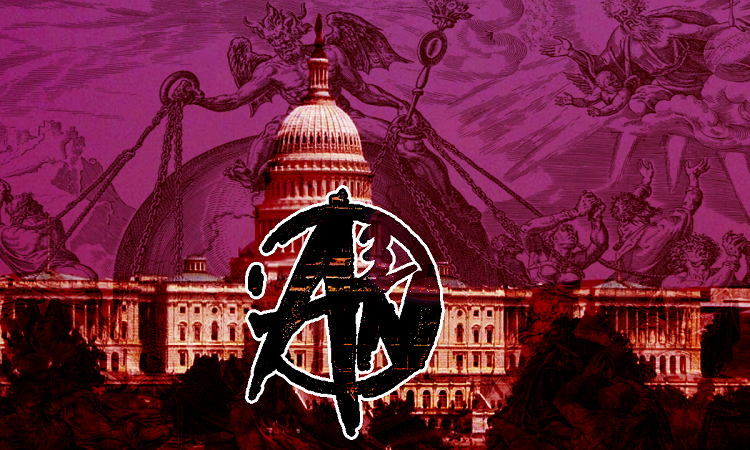
Government: A System of Slavery
Introduction
This is a prequel and a sequel to Legitimizing A System of Slavery. Unfortunately, due to some misreading and misconceptions, some responded with personal attacks and misguided criticisms. I hope to clarify those misconceptions respectfully. Some of those misconceptions are that the article only made “what if” claims and was inconsistent. The other was that government is not a system of slavery.
“Big L” Libertarians, “the party of principle,” is inconsistent. If they were genuinely consistent, they’d be agorists. They’d already have agreed that voting and otherwise participating in government legitimizes a system of slavery. The agorist focus on seeking consistency and the truth is noble. We agorists should all be proud of our consistency and ignore the gaslighting and disoriented political rhetoric, and we have done so exceptionally well.
One “criticism” that has been made is that we use “what if” claims in arguments for agorism. These arguments are hardly a compelling “criticism,” when said claims are the cornerstone of the of the neo-statists and politically active groups or political organizations as well.
What if we win politically locally, statewide, or federally?
Nothing noteworthy has been achieved politically in the modern era regarding liberty, so political voodoo has been a colossal loss in resources and time. But, on the other hand, agorism has achieved more liberty in the modern era than politics has by laying the groundwork to shift from statism to liberty. Out of many examples of a shift towards liberty, one can be found in this article titled Savior in the Shadows, written by Graham Smith.
Truth, Logic, and Reason
Although I did discuss how the government is a system of slavery, I feel like I need to elaborate.
This article, Legitimizing A System of Slavery, ignited a firestorm of cognitive dissonance and has been wrongly labeled as inconsistent when no inconsistency can be found.
How is it inconsistent to say that we should do everything outside the state? Every action outside the state would be consistent with staying out of government politics or not getting involved in politics.
Truth is determined by correspondence with reality, and the nature of logic determines soundness. Therefore, there is no place for personal attacks, anti-intellectual distractions, or other examples of intellectual dishonesty.
Some people have taken opposing sides on social media about my controversial article, not based on philosophical discussion, but simply out of popularity. I suspect many have taken sides on this without consideration. These are the same voters who believe change will come from a ballot box of a rigged system, locally, or otherwise. They appear to conclude that only “likes” and podcasts matter.
Ironically, they have already proven the point as to why political games won’t significantly achieve liberty or more individual freedom. Because popularity contests always work, right? Yeah, well, you got Joe Biden.
In other terms, these liberty advocates want to use the government, a system of slavery, to gain more individual liberty, which is ineffective, inconsistent, immoral, and unprincipled.
For those who are willing to consider reason and a position other than their own, consider the following:
Eminent Domain
Some countries around the world have eminent domain. Eminent domain is the right of the government to take private property, without consent, for public use, as long as “just compensation” has been given in exchange for private property.
So, if the government can take away your private property without your consent at any point in time, are you truly the owner of said property? I guess you get compensated, but what is just? And how do we measure the sentimental value or family property that has been passed down for generations? This is like someone walking into your house, taking whatever they wanted without asking, and throwing a wad of cash at you.
What if they took something you couldn’t replace, or get another one? What if you didn’t want to give it up? These are questions that we need to ask. We’ll examine Feudalism in this next section.
Modern Feudalism
Feudalism is broadly defined as a system for structuring society around relationships derived from landholding. Feudalism was the dominant social system in medieval Europe between the 9th and 15th centuries. In feudal days, serfs, peasants, and other workers were obligated to give their lord, the nobility of the land, homage, labor, and a share of the produce in exchange for being allowed to live and work the land. Although modern, more sophisticated, and less of a class system, there are striking resemblances to feudalism today.
Today, we give a certain amount of our labor in the form of income tax and an amount of the share of the produce in sales tax to the state. On top of that mountain of taxes implemented, is property tax. Property tax is a big one, because even if you “own” your home outright and have fully paid the mortgage, you must still pay an annual property tax, or as I like to put it, rent. If you do not pay property tax, the state will confiscate your land or home.
If the government can seize your land because you did not pay fees for it, are you really the owner? Or do you just pay annual rent so as to avoid eviction? In my comprehension of ownership, it must be the latter, and if you’d like a more detailed look at ownership, see this Agorist Nexus article, The Navajo And The Contaminated Water Problem.
So, if you are lucky enough to be in one of the 23 countries or a handful of states that do not have to pay property taxes, odds are, you’re still being extorted from in labor or consumption, also known as income or sales tax. The reality is that most of the global population, at the very least, are living in a modern feudal system just as serfs or peasants, but it might go much deeper than that.
A side note here is that U.S. citizens are legally required to file income tax even if the money is made outside the U.S., having nothing to do with the country.
Anarchy And Freedom Defined
It could be argued that a significant point of anarchy is to eliminate slavery, “whether in the form of feudalism or chattel slavery”; this is the very meaning of anarchy. Anarchy comes from the Medieval Latin anarchia and from the Greek anarchos (“having no ruler”), with a- + Archos (“ruler”) meaning “without a ruler.”
The definition of a ruler is a person exercising jurisdiction or dominion over other persons. So, for many awakenings that have resulted in anarchy, one big one is the realization that we do not want others to be merely just property or slaves of the state…that we need not be ruled over.
If we do not want to be ruled over, what, then, is the definition of freedom? The definition of freedom is the power or right to act, speak, or think as one wants. Freedom is a beautiful thing. There is nothing wrong in freely acting as long as someone is not harming others or creating victims.
Defining Slavery
Merriam-Webster today defines slavery as the state of a person who is held in forced servitude.
Wikipedia states that:
Involuntary servitude or involuntary slavery is a legal and constitutional term for a person laboring against that person’s will to benefit another, under some form of coercion, to which it may constitute slavery. While laboring to benefit another occurs also in the condition of slavery, involuntary servitude does not necessarily connote the complete lack of freedom experienced in chattel slavery; involuntary servitude may also refer to other forms of unfree labor. Involuntary servitude is not dependent upon the existence of compensation or its amount.
Here, involuntary servitude does not necessarily connote the complete lack of freedom experienced in chattel slavery. Wikipedia also states that involuntary slavery does not necessarily mean total ownership of another.
And according to National Museums Liverpool, Chattel slavery means that one person has total ownership of another. There are two basic forms of chattel: domestic chattel, with menial household duties, and productive chattel, working in the fields or mines.
A necessary trait of slavery is a person laboring against that person’s will to benefit another, under some form of coercion. For example, everyone who pays income tax is coerced to do so under the threat of imprisonment, also known as being kidnapped and locked in a cage, and, if you refuse, assaulted and ultimately murdered.
It’s important to highlight that involuntary servitude is not dependent upon compensation or its amount. In other words, just because it’s 10% and not 100% doesn’t mean that it’s not involuntary slavery.
So at the very least, governments that have implemented an income tax are slavers just solely by definition alone; definitionally, every government on the planet except Bermuda, Monaco, the Bahamas, and the United Arab Emirates.
Knowing the general nature of government, I suspect these countries will implement some income tax in the future, or for that matter, already have some other method of extortion in place. An example of a newly added income tax came from the country of Andorra, located between France and Spain in the Pyrenees mountains, which had no income tax until 2015. Then, in 2015 they introduced a scalable tax rate for individuals making over 40,000 euros a year.
Extorting income in other ways would also fit under this definition. For example, if your income or way of making a living was by investing in stocks and you were forced to pay out capital gains tax.
In 2020, only a handful of countries didn’t close their borders, two of those that never imposed travel restrictions to and from at any point in time being Nicaragua and Mexico. If a government won’t let you leave, are you a free human being? Or are you a prisoner? What if they force you to close down your business? At one point in time, Australia wouldn’t even let their “citizens” back into their own country, even if they wanted to. What’s the point of having a passport if they won’t let you use it to return home? Are you a free human being if the government won’t allow you to participate in society without injecting something into your own body?
At this point, you have lost the power or right to act; in other words, you have lost your freedom.
Government is just a group of slavers extorting inhabitants in a geographical area that gives the extorted wealth to their supporters in the guise of the collective good.
Previous Article
These definitions coincide with exactly with what I said in my previous article, Legitimizing A System of Slavery, just more simply put. In that article, I said:
“Just go up to any one of them and tell them you are a free human being that won’t be extorted by taxes and off to a cage with you. If you are forced to pay 1% of your income or be caged, you are not a free human being. There are different degrees of slavery. The only question is, how much of a slave are you?”
There are no exaggerations here. Either you’re a slave, or you’re not. You either have the freedom, the power, or the right to act, or you don’t. There is no in-between. Some slaves have longer chains than others. The opponents to this fact simply deny the meaning of the words involved. Such denial does not and cannot change reality.
Slavery Evolved
The Emancipation Proclamation, signed to free the slaves ONLY in the Southern states, went into effect on January 1, 1863. The IRS (a.k.a., the “Internal Revenue Service,” that doesn’t generate revenue nor service anyone) was founded on July 1, 1862. So, slavery just went from a small group to almost everyone. I want to clarify that I think it was a good thing that they obtained more freedom and, for the most part, got rid of complete ownership and that I don’t want anyone to be enslaved, ever.
There is a reason these slavers want a monopoly on violence. That is to wholly dominate the herd and thoroughly enslave the majority of the entire global population.
Even if the government you live under has no income tax, it’ll do everything in its power, and even outside its legal bounds, to implement it into existence. No government has absolute consent of every serf in the geographical area they dominate.
Our lives are only numbers to them. It is far easier to have slaves who think they’re free than have slaves who know of their enslavement. Government is a system of slavery, and participating in a system of slavery or legitimizing it through political action is immoral.
Conclusion
With eminent domain, the government can take away your property whenever they deem it and without your consent. In the end, paying property tax is just rent, all other euphemisms aside.
We’ve also discovered that by paying income tax, property tax, and sales tax, creates a structure similar to feudalism, also known as modern feudalism. Simply put, involuntary slavery does not mean total ownership or that certain amounts have to be taken in order for it to be involuntary slavery.
In conclusion, the sad reality is, that government is a system of slavery and that most of the population on the planet is enslaved. And some small dismal numbers are at the very least serfs or worse. But all hope is not lost, and more people are opening their eyes now more than ever.
The time has come where we have to not only just talk about freedom, we must also do something about it; and we have an answer, agorism, and counter-economics. It is paramount that we quit funding the slavers that use those funds to bind us to chains and enslave our fellow man.







